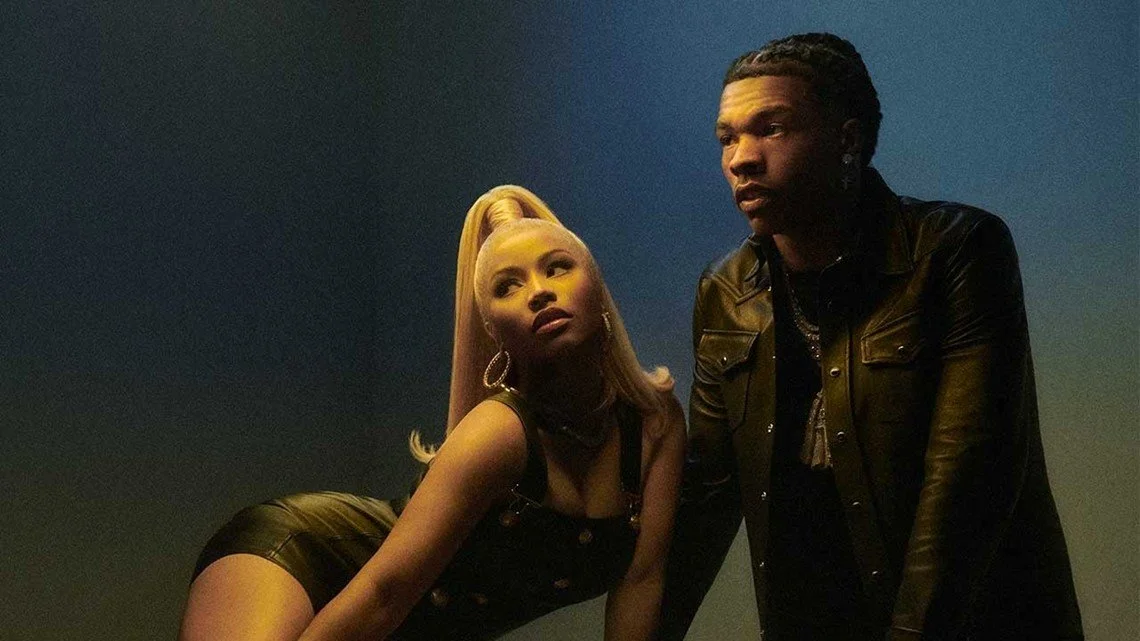Album Review: Kid Cudi's 'Man On the Moon III: The Chosen' Is A Worthy Finale
Unlike most of us, Kid Cudi has had a pretty good 2020. The rap icon starred in Luca Guadagnino's HBO miniseries We Are Who We Are and scored his first #1 single with "The Scotts," the first single from the duo of the same name he formed with Travis Scott. Cudi has had a fruitful genre-spanning career beginning with his seminal debut album, Man On the Moon I: The End of Day, and multiple visionary records like 2016's Passion, Pain & Demon Slayin', and 2018's Kids See Ghosts, a joint album with Kanye West. Man On the Moon III: The Chosen seeks to bring the iconic trilogy to a close as it meanders through the final chapter in Cudi's immersive story of darkness, depression, rage, and triumph. Featuring appearances ranging from Pop Smoke to Phoebe Bridgers, The Chosen is a shapeshifting patchwork of genres that delivers a solid narrative that holds up despite the overblown length of the album.
Split into four acts, Man On the Moon III: The Chosen begins with a return that is anything but victorious. The album's opening act, "Return 2 Madness," soundtracks Cudi's descent into the place of darkness and cold solitude that so much of his discography exists in. Many of Cudi's longtime collaborators join him for the finale of this trilogy, but the very beginning of this album is highlighted by Take a Daytrip ("Mo Bamba," "Holiday"). The production duo takes the helm of "Tequila Shots," the strongest Act I song and the album's first full-length track. The song has more singing than one would expect given the beat, but that booming bass doesn't make it any less of a battle cry. "This time I'm ready for it/This fight, this war in me," Cudi sings, with all the passion and determination in the world. There's a sense of finality that hangs over most of Man On the Moon III: The Chosen. That finality feels more wistful towards the end of the record, but the drama is upped in the first half. Cudi's singing on the album sits in a slightly husky baritone that adapts excellently to any style of production thrown its way. At times, Cudi channels a bit of Travis Scott with his ad-libs and Auto-Tuned croons. Obviously, there's a lot of Cudi in Travis' musical DNA, but it's clear the two influence each other, especially after "The Scotts." "She Knows This" is the most overtly Travis Scott-esque song on the album, and it also happens to be one of the weakest. Besides the flawless beat switch, the weak hook doesn't do the song any factors. Act I is a solid entry point for the album, and luckily the record only improves on its foundation.
Housed in Act II are "Damaged" and "Heaven On Earth." The former can't shake the Travis feel of some of its predecessors, and, lyrically, it's a bit too on the nose to feel sincere. The simple chorus goes "How it goes when you're a damaged man/This is how it goes when you're a damaged man" and speaks of how he was "doomed since [he] left the womb." "Damage" simply tries too hard at getting across points and themes that Cudi has previously covered, and more effortlessly at that. The latter, "Heaven On Earth," shifts into a more inventive lane of songwriting that feels distinctly Cudi-esque. The imagery of "angels protectin' [his] soul" as he makes his way through a sex-fueled drug-addled false Heaven is nothing short of gorgeous. "Heaven On Earth" also sets the scene for two of the album's strongest cuts. "Show Out," a collaboration with Pop Smoke and Skepta produced by Dot Da Genius and Plain Pat, sees Cudi surprisingly holding his own against the drill beat. Admittedly, it's eerie hearing Pop's voice on a track after his passing, but between his hook and Skepta's show-stealing verse, "Show Out" can't help but be a stunner. It's the bridge, however, that really makes this song what it is. Cudi belts "Lord, are you hearin' me call out?/Am I lost? Pray for me," giving a deeper meaning to Pop's "show out" hook. He is aching for a higher power to "show out" and help him out of his abyss of misery. "Mr. Solo Dolo III," the third track of the Solo Dolo series, follows with a candid look at isolation and depression. Cudi's voice sometimes sits right below the instrumental which gives the sonic illusion of him drowning in a pool of sound. It's a not-so-subtle, but still beautiful touch production-wise.
Wicked Awesome/Republic
Man On the Moon III: The Chosen also has its fair share of ballads. Sometimes, it feels like the album has more than its fair share, unfortunately. "Sad People" is an utterly forgettable song that drags on for far too long and "Sept. 16" is Cudi's heartfelt dedication to his girlfriend that still lands on the weaker end on most of the album's tracks. The repetitiveness of "Sept. 16" prevents it from reaching its full potential, and the two songs don't really progress at all during their durations which stunts the album's overall momentum. Luckily, things pick up with "The Void." The album's third and fourth acts are mostly concerned with driving home the message of Cudi's triumph in the face of his mental health battles and reminding his fans that they are not alone. "Rockstar Knights," "4 Da Kidz," and "Lord I Know" work together to deliver different fragments of that messaging, but it all ends up feeling a bit redundant by the time the album ends. Cudi has a tendency of making overly long albums, and at just under an hour, The Chosen is far from his longest project, but it sure does overstay its welcome. What makes the length such a pain is that Cudi gets his point across in nearly-perfect songs and then spends three more songs hashing out different ways of saying similar things. When he zeroes in and delivers those stellar moments, however, he's unstoppable. For example, there's "Elsie's Baby Boy (Flashback)," a brief, yet stark, look at Cudi's childhood. With this song, Cudi makes a last-minute play for Best Use of a Sample in 2020 with his interpolation of the guitar melody from The Animals' "The Housing of the Rising Sun." The sample combined with the slight doo-wop inflections in his verse melody make for one of the most unexpected yet outstanding musical moments on the album. It's the rare case where the sonic vision is perfectly in tune with the wistfulness of the lyricism. There's also "Lovin' Me," the standout Phoebe Bridgers-featuring self-love anthem that plays up the rock and alternative parts of Cudi's sonic profile. The pair's voices sound absolutely beautiful together.
"Baby, I'm a warrior," sings Cudi on the pre-chorus of The Chosen's final track. The defiance, tiredness, and hope in his voice reflect his long-fought and hard-won victory in a battle that he has been fighting in front of the whole world for decades. Cudi's Man On the Moon series is one of the most important in hip-hop. His honest revelations about depression, toxic behaviors, and fighting through it all have gifted us not only some of the best music of the past decade or so but also some invaluable life lessons. The Chosen is a worthy finale to an album series with a legacy as iconic and as storied as this one. At times, the record does seem to rest on its laurels a bit, but despite a dud here and there, The Chosen is truly great. The record excels at one thing, the most important thing Cudi has been aiming for: peace.
Score: 74
Key Tracks: "Tequila Shots" | "Show Out" | "Mr. Solo Dolo III" | "Elsie's Baby Boy" | "Lovin' Me"





